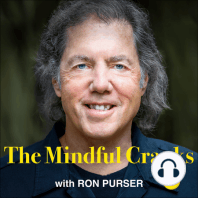1 min listen

Episode 27 - Daniel Nehring - Mindfulness and Therapeutic Cultures
Episode 27 - Daniel Nehring - Mindfulness and Therapeutic Cultures
ratings:
Length:
63 minutes
Released:
Sep 27, 2020
Format:
Podcast episode
Description
In this Episode, I spoke with Daniel Nehring, who is an Associate Professor of Sociology at East China University of Science and Technology in Shanghai. Daniel is, in my opinion, an ascending and prolific scholar in the field of critical sociology, and an amazing networker who has brought together a diverse group of international collaborators from multiple disciplines who are doing cutting edge research on therapeutic cultures across the globe. Our conversation explores how therapeutic discourses have not only penetrated a range of institutional regimes, but also how such discourses have a global reach, with mass consumption in China, for example. We talk about the rise of the “self-help entrepreneur,” and how such figures as Jon Kabat-Zinn utilized various rhetorical and discursive strategies to bolster his narrative authority and commercial success. We also talk about the relevance and important of C. Wright Mills and his classic work, The Sociological Imagination, in contrast to what Daniel calls “the psychological imagination” which informs the self-help genre and the mindfulness literature – focusing on an article he recently published this year with Ashley Frawley in Sociology of Health and Illness. Our mutual admiration of C. Wright Mills is evident in that we both share in the view that academics have become beholden to a bureaucratic ethos and the stranglehold of neoliberal audit culture – and that academics need to wake up, speak up and become actively engaged as public intellectuals. His recent publications in this area include Transnational Popular Psychology and the Global Self-Help Industry (Palgrave, 2016), Therapeutic Worlds (Routledge, 2019), The Routledge International Handbook of Global Therapeutic Cultures (2020), Imagining Society (Bristol University Press, ). He is also the convenor of several international academic networks ‘Popular Psychology, Self-Help Culture and The Happiness Industry’ and Open Minds. Daniel is an editor of the book series Therapeutic Cultures for Routledge and hosts the Global Therapeutic Cultures podcast.
Released:
Sep 27, 2020
Format:
Podcast episode
Titles in the series (49)
Mindful Cranks Jingle Introduction: This is the jingle introduction to the Mindful Cranks podcast. by The Mindful Cranks